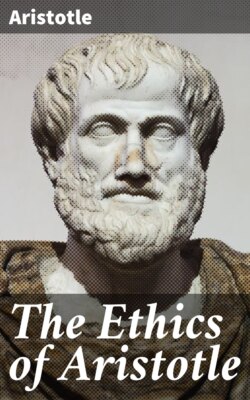The Ethics of Aristotle

Реклама. ООО «ЛитРес», ИНН: 7719571260.
Оглавление
Aristotle . The Ethics of Aristotle
The Ethics of Aristotle
Table of Contents
INTRODUCTION
Book VI appears to have in view two aims: (1) to describe goodness of intellect and discover its highest form or forms; (2) to show how this is related to goodness of character, and so to conduct generally. As all thinking is either theoretical or practical, goodness of intellect has two supreme forms—Theoretical and Practical Wisdom. The first, which apprehends the eternal laws of the universe, has no direct relation to human conduct: the second is identical with that master science of human life of which the whole treatise, consisting of the Ethics and the Politics, is an exposition. It is this science which supplies the right rules of conduct Taking them as they emerge in and from practical experience, it formulates them more precisely and organises them into a system where they are all seen to converge upon happiness. The mode in which such knowledge manifests itself is in the power to show that such and such rules of action follow from the very nature of the end or good for man. It presupposes and starts from a clear conception of the end and the wish for it as conceived, and it proceeds by a deduction which is dehberation writ large. In the man of practical wisdom this process has reached its perfect result, and the code of right rules is apprehended as a system with a single principle and so as something wholly rational or reasonable He has not on each occasion to seek and find the right rule applicable to the situation, he produces it at once from within himself, and can at need justify it by exhibiting its rationale, i.e. , its connection with the end. This is the consummate form of reason applied to conduct, but there are minor forms of it, less independent or original, but nevertheless of great value, such as the power to think out the proper cause of policy in novel circumstances or the power to see the proper line of treatment to follow in a court of law
J. A. SMITH
ARISTOTLE'S ETHICS
BOOK I
VII
VIII
XI
XII
XIII
BOOK II
II
VII
IX
BOOK III
III
III
VII
VIII
XI
XII
BOOK IV
I
II
III
V
VI
VII
VIII
IX
BOOK V
II
III
IV
XI
BOOK VI
II
IV
V
VI
VII
VIII
IX
XII
XIII
APPENDIX
BOOK VII
I
II
III
IV
V
VI
VII
VIII
X
XI
XII
XIV
BOOK VIII
II
III
IV
V
VII
VIII
IX
X
XI
XII
XIII
XIV
BOOK IX
I
II
III
IV
X
XI
BOOK X
VI
VII
VIII
IX
NOTES
A B . 400 600
Отрывок из книги
Aristotle
Published by Good Press, 2019
.....
Some plausibility, it is true, this argument possesses, but it is contradicted by the facts of the Arts and Sciences; for all these, though aiming at some good, and seeking that which is deficient, yet pretermit the knowledge of it: now it is not exactly probable that all artisans without exception should be ignorant of so great a help as this would be, and not even look after it; neither is it easy to see wherein a weaver or a carpenter will be profited in respect of his craft by knowing the very-good, or how a man will be the more apt to effect cures or to command an army for having seen the [Greek: idea] itself. For manifestly it is not health after this general and abstract fashion which is the subject of the physician's investigation, but the health of Man, or rather perhaps of this or that man; for he has to heal individuals.—Thus much on these points.
And now let us revert to the Good of which we are in search: what can it be? for manifestly it is different in different actions and arts: for it is different in the healing art and in the art military, and similarly in the rest. What then is the Chief Good in each? Is it not "that for the sake of which the other things are done?" and this in the healing art is health, and in the art military victory, and in that of house-building a house, and in any other thing something else; in short, in every action and moral choice the End, because in all cases men do everything else with a view to this. So that if there is some one End of all things which are and may be done, this must be the Good proposed by doing, or if more than one, then these.
.....